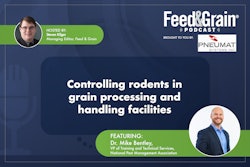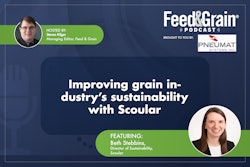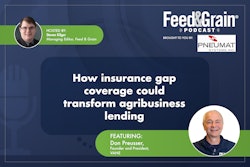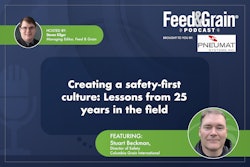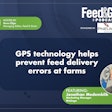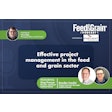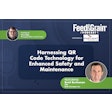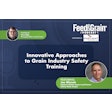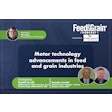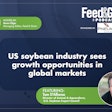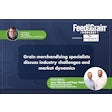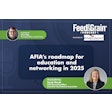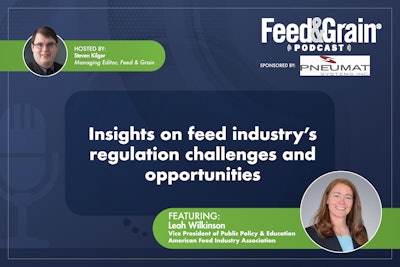
In this episode of the Feed & Grain Podcast, host Steven Kilger sits down with Leah Wilkinson, Vice President of Public Policy and Education for the American Feed Industry Association (AFIA), to discuss the latest developments in feed industry regulations and policy. Recorded at the International Production & Processing Expo (IPPE), this conversation provides a thorough overview of the challenges and opportunities facing the global feed industry.
View on Zencastr
Steven Kilger - 00:00
Hello, my name is Steven Kilger. I'm the managing editor of Feed & Grain Magazine and the host of the Feed & Grain Podcast. Thank you so much for joining me today as we dive deep into the issues affecting the feed manufacturing, grain handling and allied industries.
Today's episode is brought to you by the BinWhip from Pneumat Systems. The powerful dual impact BinWhip removes the toughest buildup and blockages in industrial storage silos without hazardous silo entry. Learn more today at BinWhip.com.
Today my guest is Leah Wilkinson, the vice president of Public Policy and Education at the American Feed Industry Association. We sat down at this year's IPPE to talk about the AFIA's legislative priorities on the federal and state level going into We also spend some time talking about the changes to feed ingredient approvals and the new pathways for getting that done.
I hope you enjoy the interview. If you want to help out with the podcast and listening to this in a podcasting app, please rate us and subscribe. If you're listening online, sign up for the Feed & Grain newsletter, Industry Watch to see when new podcasts drop and stay up to date with all the news from around the industry.
Now onto the show.
Thank you so much for joining me today.
Leah Wilkinson - 01:12
Thanks for the opportunity.
Kilger - 01:13
Yeah, it's the last day at IPPE. It's been a fun show, a busy show. I'm sure you've been, well, I know you've been running around all over the place. You've been giving talks and sessions and all that stuff, but for anyone who doesn't know you, hasn't seen you at this show, tell me a little bit more about yourself and what you do with AFIA.
Wilkinson - 01:31
Sure, so I'm Leah Wilkinson, vice president of Public Policy and Education for the American Feed Industry Association. That means I oversee our legislative and regulatory work on behalf of our members. So AFIA is a trade association that represents the global feed industry. We have feed manufacturers, pet food manufacturers, ingredient suppliers, equipment manufacturers, really anybody that has anything to do with the feed industry. Is our members and we work and advocate on their behalf at the state and federal level, work internationally as well, and then host networking events like IPPE and do education offerings as well for the industry.
Kilger - 02:13
Yeah, you guys have a lot on your plate.
Wilkinson - 02:14
It's busy, but it's great.
Kilger - 02:15
Well, you gave a talk yesterday, a tech talk here at IPPE about the new feed ingredient regulations that are kind of going into effect. So there were three, one was in partnership with AAFCO, then it went temporarily down to two and now it will then back up to three. And now AAFCO is going to introduce a fourth. You explained a little bit about, well, what the heck is going on?
Wilkinson - 02:40
So the whole area of our ability to get ingredients approved in the United States has been a priority for AFIA. We need those systems to be there, right, so that we have processes to bring ingredients through. We need them to work efficiently, effectively, and meeting the types of products. That our companies are really looking to bring to market. The most recent challenge that we had here that she mentioned is, like you said, we had three ingredient approval pathways and the Food and Drug Administration was really the key to all of those. The FDA still has their food additive petition process and the generally recognized as safe process or GRAS if you use that acronym. But the other piece was their partnership with AAFCO, the Association of American Feed Control Officials, for their ingredient review pathway.
And FDA was the safety reviewer for AAFCO. And so those two worked together under memorandum of understanding. And that memorandum was only about years old. But they've been working together on this for decades and so now FDA said we can't extend that MOU anymore so they're going to still be part of AAFCO working on safety issues, inspections, that type of thing but they're not going to be doing ingredient reviews. So that happened last fall and that AAFCO review process stopped on October 1st. So we were at a vacancy, right? We lost that pathway, but both FDA and AAFCO stepped up and realized that was going to put the industry in a tough spot.
And so they both started working on a new process to replace it. And so that's where in early January, FDA came out and said that they were going to put in the animal food ingredient consultations. So AFIC. It's an acronym soup you can play and AFIC went into place in January and it is meant to replace the AAFCO ingredient process from an FDA perspective. So they are going to allow the same types of ingredients that would have gone through AAFCO before to utilize this new consultation process. The data requirements are going to be the same. They are proposing a new thing though that they're going to be public with the ingredients that are going through the AFIC process.
So they're going to have a website, they're going to post and say that this ingredient is pending review and then they'll post their, they're going to call it a consultation complete letter and that'll get posted to the website. They're going to take some public comment through this process as well. That whole transparency thing was one of the reasons why FDA stepped away from AAFCO.
Kilger - 05:27
Were they getting pressure to make the whole process more transparent?
Wilkinson - 05:31
They were getting pressure and FDA was doing the AAFCO work without any legal authority. And so they were using enforcement discretion. Now the irony is they're still using enforcement discretion with the AFIC process. While they are continuing to work and improve the food additives and the grass processes, which AFIA has asked them to do over the last couple of years too. So lots of things going on in the ingredient world right now.
Kilger - 05:59
Yeah, well you were just at the AAFCO meeting I guess, what, last week? Yes, their mid-year meeting was last week. Where they voted on their new system. Can you tell us a little bit about what that system is and what its kind of place is in this kind Why does it exist? Why isn't the FDA solution? Why aren't those solutions enough?
Wilkinson - 06:18
Why aren't those three enough? So yeah, so we've got the FDA. Replacement and now, like you said, AAFCO and their part that they were going to do to replace their loss pathway. They had a proposal that was out for comments this last fall and they want to contract with Kansas State Olathe, one of their branch campuses, and the AAFCO membership voted to approve this contract and they will use them as an administrator for the review process. And then they will also pull in subject matter experts to help them review these ingredient submissions. And the intent is it will allow AAFCO to have a pathway to continue to get ingredients listed in their AAFCO official publication. It will provide industry another pathway that would allow ingredients to filter into the right pathway depending upon the type of product you have or the type of data that you have.
This new AAFCO pathway is going to be a way that we can modify current AAFCO definitions because that was something that we lost with the MOU going away. We have lots of definitions that are maybe for a single species now, but they want to add more species or maybe add a different processing step to it. We didn't know how to do that until AAFCO created this new step.
Kilger - 07:44
Well and it's the AAFCO book is what you were saying yesterday a lot of states use as their guide to what they should approve and what they should approve in feed in their state, right?
Wilkinson - 07:55
Yep, so feed is regulated at the federal level and the state level and so that gets complicated so you've got to make sure whatever pathway you're using that it meets the federal requirement. But then like you said, the state feed laws also have to make sure that those ingredients are approved. And state feed laws require them to be in the AAFCO official publication. The secretary or commissioner of agriculture can create their own list or approve ingredients on their own, but it's really that AAFCO official publication that they look to. So that was a key for both the new AFIC process that got established, that those ingredients can get into the AAFCO official publication. But then also whatever AAFCO sets up, that FDA is going to be okay with it. And so the way AAFCO has set theirs up is it's like grass.
It's that generally recognized as safe and you're meeting those same requirements at a federal level for grass. Now you're just gonna, I call it GRAS Plus. So you're doing your independent grass conclusion, you're giving it to AAFCO. Now you're going to have some more outside experts look at that grass submission and, and give you more confidence that the product is safe.
Kilger - 09:07 I think they should take your naming convention. They're probably going to give it some long acronym or something, but GRAS Plus is just better, I think.
Wilkinson - 09:14 Yet to be named.
Kilger - 09:15
Well, it's all interesting. I love it. I mean, it is our system, right? Where sometimes the government's like, we're going to make it more transparent, but then they just make it more complicated.
Wilkinson - 09:24
And that's why we're here at AFIA to try to help our members navigate the change.
Kilger - 09:28
That's always who I really feel bad for is, you know, smaller companies. We're doing cutting edge work with probably not huge staffs anymore, and they have to get these ingredients improved and to Ask a startup or someone to go through this process is I'm sure very expensive and very complicated to figure out.
Wilkinson - 09:46
And it can be intimidating, right?
Kilger - 09:48
Oh yeah. I mean, anytime you get the federal government involved, I mean, it's intimidating, especially when, you know, the hopes of your ingredient, this thing that you've invested all this money into is now kind of a yes or no binary from the government. We follow federal, obviously, quite a bit. Is there anything interesting going on at the state level that any manufacturers should be aware of coming down the pipe? The great thing about state government is state legislators and things are usually a lot more willing to listen to business owners and people in their community than the federal. So sometimes you can get stuff changed there, you just have no chance on the federal level.
Wilkinson - 10:25
So this year is one of the years where all 50 states are having their legislative session. There's a couple of states that are every other year, but when odd year, right? So 2025, all of those states are having their legislative session. And they started in January. The season of state legislation and monitoring all the bills that get introduced, it started.
Kilger - 10:49
I know, that's not a tough job for you.
Wilkinson - 10:51
I have Louise Calderwood who manages that and does a great job for us. We are watching this year for the theme that's been the last couple of years is bills that get introduced that want to add fees. Or requirements to our companies that register and pay for that registration in states for their feed or their pet food products. And so whether it is an additional fee to pay for spay and neutering, dogs and cats, Or water quality grants, animal welfare, that has been to fund animal welfare efforts at a State Department of Agriculture. There's been a varied number of ways that states have seen the fees that our industry pays to regulate, to be regulated, right? That's why we pay those fees. To siphon those fees off or add them to so they can go pay for other programs in the department.
Wilkinson - 11:52
We've had a few of those introduced already. We're expecting a few more and just making sure that we continue to have that ability to pay for the commercial feed program to run and not put an extra burden on our members that doesn't relate to being regulated.
Kilger - 12:09
What seems to be more common in state and local governments is instead of raising taxes, which is politically not very popular, to instead raise fees and try to get money for programs they want to run from other places.
Wilkinson - 12:23
And it's going to be an interesting time if we're going to be cutting federal government funding at the federal level. I know there's been a lot of states that have activity in the PFAS area with either looking at water contamination or soil contamination. So will that trend continue at the state level with more states doing that? So it's going to be an interesting spring season to watch.
Kilger - 12:47
What else is your, as you put it with another session at IPPE, what else is keeping you up at night? What else are you worried about? What else are you watching at the federal government level?
Wilkinson - 12:56
So it's, we have a new administration, we have a new Congress, new administration, new Congress. You know, really trying to get things up and running. The House and Senate have elected their leaders, they've appointed their committee, the committee leadership, the committee members, and they're getting up, running, and getting moving. So the big thing with the Senate is getting all of the president's appointees Through their confirmation hearings, through the votes in the committee, and then through the full confirmation by the Senate. And we just had the EPA administrator get that Senate confirmation yesterday, Lee Zeldin. So that's kind of priority number one on the Senate side is getting all those political appointees in place.
Kilger - 13:42
Well yeah, because they will direct how all of these federal organizations run and what their priorities are.
Wilkinson - 13:49
They will, and it's really key. So last week at the AAFCO meeting, the FDA officials had to depart the meeting. And it's standard that when any new administration comes in that they step back, they slow down, you know, want to make sure that messages coming out of an agency are meeting that administration's priorities and messages. And so within the Department of Health and Human Services, where the Food and Drug Administration resides, They were told to, you know, pull back, not do any public appearances unless all of those messages were run through the political chain and not having the cabinet secretary there yet, not having any political appointees. That just slowed everything down and so they're like even here we were not able to get our FDA officials to come to IPPE so we had to pinch it and pivot and fill in and so just yeah getting those political appointees is key and so things can continue to go and they always go back and look at the things that the last administration did.
We like, you know, they put in place the new AFIC, right? So we want that to continue to move forward and hope that will happen soon.
Kilger - 15:06
Once people are in, then you know what you really have to focus on trying to get an instant to keep.
Wilkinson - 15:11
Just have somebody to talk to.
Kilger - 15:12
I'm sure there's a few OSHA regulations and things that the Biden administration put in that people would like to see rolled back.
Wilkinson - 15:18
There were some proposals that were out there that never got finalized. So where will those stand from OSHA, the heat standard?
Kilger - 15:24
The heat standard is a big one. I did a whole podcast on it. I'm going to look real foolish if they just roll it all back and it's all worthless, but it's fine. It's a problem with being in journalism.
Wilkinson - 15:34
I think you still understand the intent, though, is to take care of our workers.
Kilger - 15:39
I mean, I've been in a feed mill in Georgia in the summer and it's not fun in there.
Wilkinson - 15:43
Yeah, so just going to continue to advocate with the new administration for our industry priorities, right? We want to make sure that we have the ability to export products because that is vital to our industry's growth as well as the ability to bring new innovations and feed all of our livestock. And making sure that they understand that we are reliant on A couple countries for supplying some of our vitamins and amino acids that we don't manufacture here in the United States. And so what can we do to help spur domestic production, innovation in that category? Can we work with some other countries that are manufacturing those ingredients to help them increase their supply? Can we find other countries that we have good trade agreements and partnerships with?
Wilkinson - 16:47
Nearshoring, you know, friendshoring. We want to just make everybody aware that we need these vital inputs for animal nutrition, animal welfare, animal production, food security. It's a human health concern too, right? So doing a lot of educating and, and then finding, trying to find some solutions that we can use to bring that production and materials back to the US.
Kilger - 17:09
Well, I think a lot of people forget that the federal government is also one of the key reasons, like export mission, branching out with U.S. agriculture products. Like these are all very important things that the federal government does a lot of. Really, it gives you guys the ability to do it. It gives U.S. Grains Council the ability to do it and a lot of organizations that rely on that funding and those programs. And it's really important for the industry, but I don't think a lot of people Realize just how much that work helped, especially since I always say it with grain side, we produce the great best grain in the entire world. And we just do. It's the safest, it's the most reliable product.
Kilger - 17:46
Same with feed products. The more we can send those out is people build up their livestock and build up their, their meat eating populations. Support in our industry is there to provide for those countries. It's harder to ship livestock than it is feed.
Wilkinson - 18:01
Exactly. And feed ingredients is another easy thing to ship. So we can do that. We can bring that innovation to them so that they can either, like you said, increase their livestock action and therefore their food security, or if they're growing in their ownership of dogs and cats too, right? That they're eating healthy diets and living those life expectations that we have here in the United States.
Kilger - 18:24
Well, thank you so much for talking to me today. I really appreciate it. hope you'll come on again once we have more of an idea of what the heck's going to be happening.
Wilkinson - 18:32
We'll continue to talk to you and share what's happening and happy to do that. And I hope you enjoy your last day at IPPE.
Kilger - 18:40
Everyone listening, thank you for doing so. Stay safe.
.jpg?auto=format%2Ccompress&crop=faces&fit=crop&h=48&q=70&w=48)


